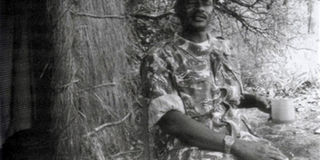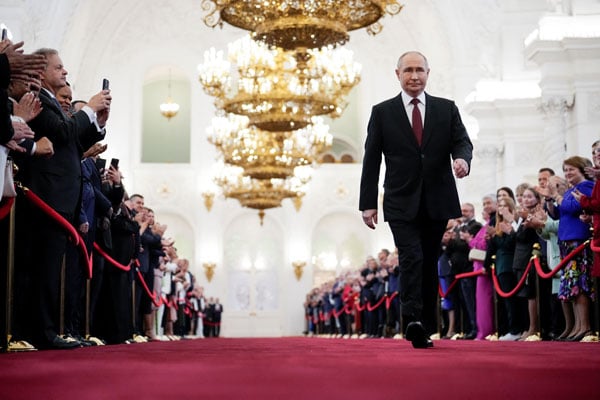I chased Museveni: I nearly captured him

President Museveni as a guerrilla fighter
What you need to know:
His two comrades Martin Mwesiga and Wunku Mpima, a.k.a Kazimoto, were not as lucky. They were shot instantly by Amin’s soldiers. The shooting happened at around 5pm in the evening. The trio was at the home of Maumbe Mukhwana, house No 49 in Maluku Housing Estate in Mbale Town. Mukhwana was a contact of Museveni’s Front for National Salvation (FRONASA) guerrilla group
Last week, Sunday Monitor ran a story of how on January 29, 1973, the then guerrilla fighter and now President Museveni evaded death by a whisker in a house in Mbale. A volley of bullets were fired at him by the Uganda Army soldiers who were pursuing him, but none of them hit the target. Thus Mr Museveni lived to tell the daring Mbale escape in his book: Sowing the Mustard Seed.
His two comrades Martin Mwesiga and Wunku Mpima, a.k.a Kazimoto, were not as lucky. They were shot instantly by Amin’s soldiers. The shooting happened at around 5pm in the evening. The trio was at the home of Maumbe Mukhwana, house No 49 in Maluku Housing Estate in Mbale Town. Mukhwana was a contact of Museveni’s Front for National Salvation (FRONASA) guerrilla group.
The three guerrillas had gone to make contact and check on the rebel camps earlier established in Bugisu, eastern Uganda. Information about their presence had leaked to Amin’s security machinery and soldiers had surrounded the house.
While it is only Museveni who had publicly told the story of this incident in his book, after 42 years last week, Saturday Monitor met a man who witnessed the events of that day. He recounts how Museveni burst out of the house running from the soldiers. He chased Museveni, mistaking him for a thief.
That man is Albert Otwabe, a retired medical assistant at Mulago National Referral Hospital in Kampala in the 1970s. Because of his medical background, Otwabe is commonly known as “doctor” in his village of Kisangani in Gogonyo Sub-county in Pallisa District. It took Saturday Monitor eight months to locate him.
Otwabe currently
Otwabe’s life is of a typical humble countryside setting. He has no mobile telephone, lives in a small house and drinks local brew (ajon) made from baked and roasted millet flour fermented with yeast.
His village was named after the eastern Congolese town of Kisangani where Ugandan and Rwandan troops fought deadly battles in 1998 and 2000 during their joint adventure into DR Congo.
When Saturday Monitor approached to interview him about the macabre events of 1973, Otwabe’s first response was: “Why do you want me to cry again?” After some persuasion, he agreed to tell his eyewitness account of Museveni’s narrow escape on that day at Maumbe’s house in Mbale in 1973.
Otwabe’s account in some episodes differs from Museveni’s version as presented in Sowing the Mustard Seed.
Otwabe’s account
“On January 29, 1973 (not January 30, 1973 as earlier recorded) at around 5 O’clock, I went to my cousin, Ezekiel Okodi’s house [at Maluku Housing Estate in Mbale] to collect my books.
He was a teacher. I did not find my cousin at home, but he came later. All of a sudden, about 10 people, some in plain clothes with guns and some soldiers came to the neighbouring house, about 20 metres from my cousin’s.
They surrounded the house and started banging doors and windows. I asked my cousin what was happening. He replied: “This being a housing estate, there could be thieves or stolen property which could have been located in that house.”
Banging of the doors and windows intensified. Suddenly, a lorry full of soldiers arrived. The soldiers surrounded the house. People inside the house started shooting. The place looked like a battlefield,” Otwabe recalls.
“Are you saying it was the people inside the house who started the shooting? Saturday Monitor probed.
“Yes, and the soldiers started shooting back,” Otwabe answers with the firmness that does not invite doubt.
While writing about the attempted arrest in Mbale and his eventual escape in his Sowing the Mustard Seed, Museveni says, on page 79: “They surrounded the house in a very unprofessional manner, without cocking their guns. They only asked one question, regarding our identity. We said we were students and straightaway, they told us to get into our vehicle and drive with them to the barracks.
That convinced me, beyond any shadow of a doubt, that the time to act was then. I had the car keys and one of the soldiers, poking a rifle into my side, told me to open and enter the car. Taking them by surprise, I jumped over the hedge, hoping that my colleagues would follow my example and scatter in different directions…”
Museveni wrote that having been captured from inside the house, he jumped over the hedge and ran away from his captors. Did the man jump over the hedge and run away from his captors if you remember? I ask Otwabe.
“Which hedge?” he wonders. “That is what he said? Me, I did not see the man [Museveni] jumping over the hedge.”
According to Otwabe, Like a film star acting as a commando, Museveni burst out of the besieged Maumbe house No49 and ran directly into a crowd which had gathered out to see what was going on in the neighbourhood.
“One person from the house opened the door and got out running towards us - the crowd- which had gathered around the place. That person was running zig-zag through the crowd that had gathered outside the house.
Taking my cousin’s word, I thought the people inside the house were thieves. I chased the man [Museveni], right up to the valley towards the forest [Bugema]. I almost caught him. The man, knowing that he had run short of steam… knowing that he had become tired, he pulled out a pistol and shot three times in the air,” Otwabe recalls.
“Are you sure he shot three times in the air and not at his pursuers?
Otwabe replies: “Yes, three times. I saw him. The soldier following me was elderly, with boots and carrying a long gun. He could not run so fast, but I was so close to the man [Museveni].
But when the man shot three times, I got scared and ducked. I left the man running and he entered the forest [Bugema] down the hill. The soldier also ducked and stopped the chase.”
Writing on this chase on page 79 of his book, Museveni says: “I ran towards a eucalyptus forest below the housing estate… I reached a big tree, took cover and fired at my pursuers with my pistol”.
From Otwabe’s version, if Museveni had stopped, looked back and fired, he would have injured or killed him. Also, if the soldier had attempted to shoot at Museveni, he would have killed or injured Otwabe who was between Museveni and the soldier during the chase.
But on the same page, Museveni writes: “Meanwhile, the soldier following me started firing, but it is not easy to hit a moving target, especially for the incapable, badly trained African soldier of Amin’s army. He kept on firing at me and missing.”
Otwabe also says if the soldier had attempted to shoot at Musveni, he would have killed many innocent onlookers who had gathered around the house. This gave Museveni an opportunity to escape and survive capture.
Otwabe tortured by Amin soldiers

Albert Otwabe (with walking stick) with his cousin Ezekiel Okodi. Photo by Faustin Mugabe
After the botched chase of Museveni, Otwabe returned home.
“I went back and entered my brother’s [Okodi] house. I found my brother-in-law in the house and the housegirl. Then soldiers started a door-to-door check. They found me, my brother-in-law and the housegirl inside the house. My cousin had gone out.
The soldiers told us to get out. When we got out, they told us “magoti chini” in Swahili, meaning “kneel down”. They told the girl to go back. One soldier came with a stick. He wanted to hit me here [shows back of the neck], and I ducked. He missed, lost control and fell down with his stick. He shouted, “Uyo ni guerrilla kweli. Ana jua tactics”, meaning “this is a real guerrilla, he knows the tactics”.
They then frog-marched us to the house where the shooting had been. In total, we were 12 people arrested - 11 men and one woman. The woman was the owner of the house where the shooting happened. The husband, I was later told, was Maumbe Mukhwana. While there, the soldiers brought three dead bodies from inside the house [of the shooting].”
“Were they three or two dead bodies?” I ask.
“They were three,” he answers firmly.
“What age were they, if you remember?” I further ask him.
“They were young men in their 20s. They were below 30,” Otwabe replies.
Back to the shooting. From press records and the record in Sowing the Mustard Seed, two people were killed inside the house. While the third is not known, the two were recorded as Mwesiga and Kazimoto. Otwabe told Saturday Monitor one soldier was shot in the left arm by the guerrillas and was rushed to hospital and the bullet was removed.
While in detention at Mbale Military Barracks, Otwabe says he heard a soldier communicating to Kampala by telephone, saying they had had an encounter with the guerrillas and that they had killed three, while the guerrillas had injured one soldier in the upper left arm. But the bullet only went through the flesh and he did not die. The third dead person remains a mystery.
Suspects tortured.
“We were told to lie down on our backs. Then they [soldiers] started walking on our stomachs with their boots.”
Did they also walk on the belly of the woman?” I ask.
“No. The woman was put aside. Then one soldier came with the gun. I do not know what happened. Maybe he was shaky. He wanted to shoot on the head of the man lying next to me, but the bullet hit between our heads. We saw smoke coming from the ground near our heads,” Otwabe narrates.
“Then a Land Rover full of military police soldiers came. An officer came and said: “Stop shooting. We want to take them as exhibits of real guerrillas.” But one [soldier] had already kicked me here [shows above the eye]. When I touched there, I saw blood in my hands. We were told to board the Land Rover. That was about 6.30 in the evening. I was not seeing properly [because of the blood oozing from the wound].
Then another soldier came with a panga (machete). He wanted to cut off my neck. I just jumped into the car and fell over the people already inside. He hit the cross bar [of the Land Rover] with the machete. The soldier said in Swahili: “Yi ni guerrilla, anajua tactics,” (this is a guerrillas, he know the tactics).
They packed us into the Land Rover and took us to Mbale Military Police base. Then they brought the lady, the owner of the house. Throughout the night, I do not know how many soldiers raped her. She was put in the office and we were put in the next room. So I could hear soldiers saying. “Have you finished? Let me also come on”. I could hear the lady screaming in pain, begging them to stop. But they continued.
PREVIOUS STORIES
Continues tomorrow in the Sunday Monitor




